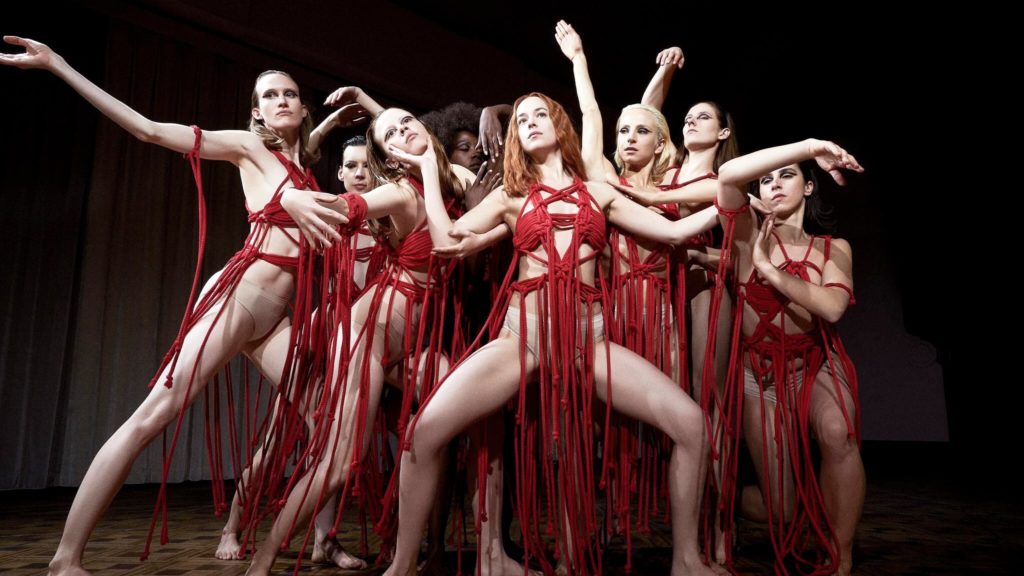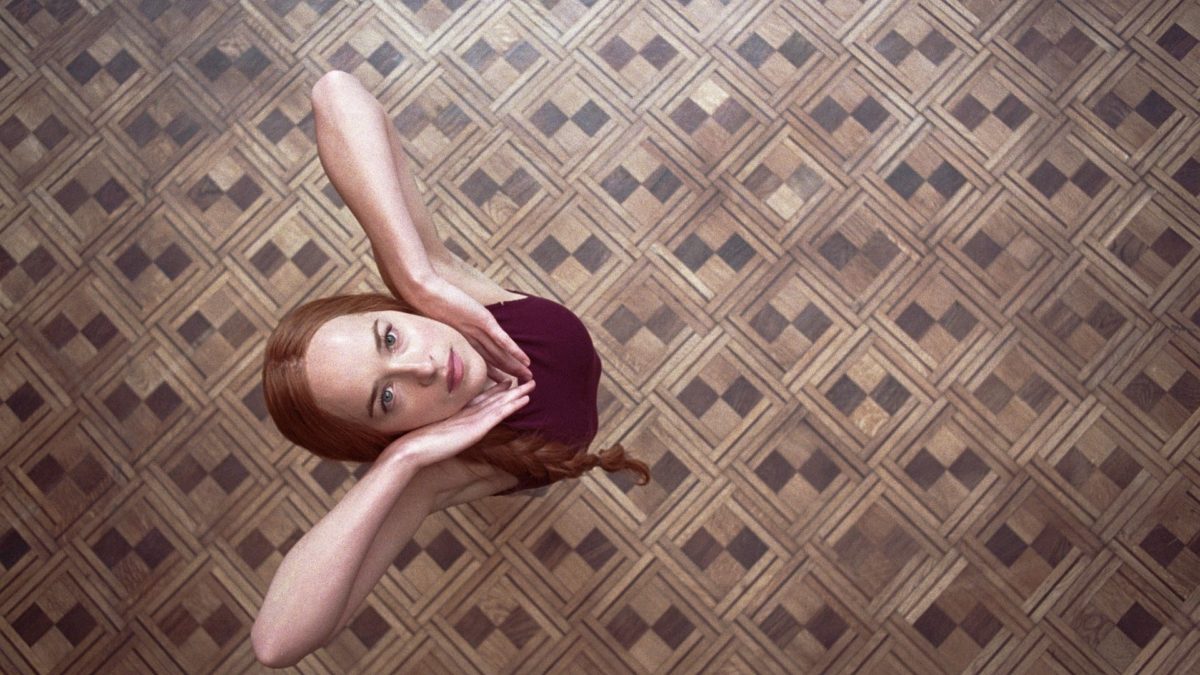The Suspiria remake seems to have been pitched with the logline, “What if instead of being a nightmare about nothing, Suspiria was a nightmare about 14 different things?” Whereas the original was content to be deathly unsettling and unstable, Luca Guadagnino has drowned his film in thematic content. It’s about the psychic burden of motherhood, and toxic feminine competitiveness, and Jungian impulses taking violent life, and the cultural trauma of Nazism, and the need to purge generationally-inherited evils, and frightening reshaping that sex and birth take upon the body. And none of those themes are even subtext, all of them are more-or-less textually and explicitly stated.
I can see this thematic maximalism being a drawback to the film; we live in an age where “elevated horror” is a buzzword for the glut of films (A24 and otherwise) that aim to inject their spooky scares with big intellectual and psychological ideas, often at the expense of said spooky scares. The density and breadth of Suspiria make it exhausting in a way my favorite horror films never are.

Nonetheless, I quite liked this movie; not as much the 1977 original, but close. (For the record, I don’t have Dario Argento’s cult classic ranked as a masterpiece; it’s a stylistic marvel, but far too lumpy as a piece of storytelling. I do, though, hold a special place in my heart for it, as it was the topic of our first podcast episode.) This remake is so good at creating and sustaining a thick, murky mood. Violence always seems just around the corner during the unsettling, elliptical character drama of Susie Bannion (Dakota Johnson) and her peers.
Guadagnino has assembled quite the cast for his film: In addition to Johnson, who brings a compelling light touch to such a grave film, we have Mia Goth and Chloë Grace Moretz as fellow students, plus a bevy of character actors as their instructors. None rise above Tilda Swinton, though, which is no surprise. Swinton is great as the cold dancing instructor Madame Blanc. She also plays an astonishing double-role and an even more memorable triple-role as the film hits its climax. Her heavily made-up appearance as a curious and sensitive male psychologist is so good, I was scrolling through IMDb on my phone as I watched, trying to see who played him, confused because I only saw women in the cast list.

Much of the film’s construction is remarkable, but no formal element stands out as much as the editing. There is some truly bewildering editing in this film by Walter Fasano, and it works on a multi-tiered level. Within individual scenes, the cuts are uneven and jagged, often eschewing the 180-degree rule, for a thoroughly disorienting effect. The film sometimes bounces between settings and even time periods as if disparate shots were part of a continuous flow. Often, the score abruptly drops or shifts. It breaks all the ironclad rules of continuity, but for all the right reasons: Mainly, to leave us as uneasy and drowned in psychological fatigue as its characters.
Suspriria runs 152 minutes, and this is its biggest flaw. If you’re going to be a big, slightly incoherent stew, better to get in and out before the audience gets bored. If you’re not pulled into its overbearing sense of dread, I suspect this will be a deeply boring film for the majority of its runtime. But I was pulled in, and found that the movie didn’t feel too far stretched past its comfort point. Certainly, the climactic half hour that leads to the 10 minute coda glue your eyes to the screen as it descends into apocalyptic mania.
I haven’t touched on other tremendous aspects of the film: The incredible sets, which echo the geometric design of the Argento original, filled with mirrors for both aesthetic and thematic purposes. The sparing use of color gives the film’s hellish descent even more impact (though it begs the question of why one would remake Suspiria in 80% grays and tans). And there’s one early kill so creative and visceral it made me queasy.
It adds up to a big movie that probably could have done with being a bit smaller. But Suspiria is, against the odds, a worthy remake that doesn’t even really bother with the pressure of being a remake. It’s just its own beastly thing, and, what’s more, its own beastly good thing.
Is It Good?
Very Good (6/8)
Dan is the founder and head critic of The Goods. Follow Dan on Letterboxd. Join the Discord for updates and discussion.


4 replies on “Suspiria (2018)”
I loved this in 2018 and haven’t changed my mind, but have not managed to rewatch it even once (it’s on Amazon still afaik, but hell, I even have a physical copy), and it is all down to that runtime. “Let’s just throw on Guadagnino’s Suspiria and have some laughs,” said no one, ever. Possibly the longest horror film I’ve ever seen? Plausibly the longest ever made (not really, but maybe the longest to ever get a major release)? How long was The Wailing? Felt like four hours, anyway.
Oh, right, Doctor Sleep’s extended cut, which I *have* thrown on to have some laughs, so maybe the whole “here’s eight movies worth of themes” heaviness might have something to do with it, after all.
If you ever want to remember that Nazis were bad, and you especially want a bunch of red-tinted naked ladies thrashing about to remind you, you know where to turn.
On the spectrum of “If you’re not pulled into its overbearing sense of dread, I suspect this will be a deeply boring film for the majority of the time,” I was somewhere in the middle for this one, which I sort of expected, but I was honor-bound to see any movie starring Dakota Johnson and Mia Goth. But I wanted to comment on the runtime issue, and to plant my flag on the hill of ‘filmmakers need to stop making such long movies.’
How many movies of this length would not be improved by being cut? I’d venture to say very few. I think there are good reasons why movies are traditionally 90-120 minutes – for one thing, that’s about how much time we spend dreaming in a night – and going longer than that is almost always a detriment to your film. Of all the movies I’ve ever seen in my life, I only love about a handful that are longer than ~130 minutes.
Obviously, there are exceptions to anything, but in general, making your movie this long just smacks of indulgence to me. Casablanca got in and out in 100 minutes. If you need an hour more than that for your story, you’d better have a damn good reason.
I love your “sub-120” hill, and I will join you to die on it. You raise some great points; I think I’m going to refer to “Nate’s Casablanca Test” in the future, comparing runtimes to that movie and whether their stories and filmmaking earn anything beyond 100 minutes. I personally call 145 minutes “The Devil’s Runtime.” Too many blockbusters live in that realm.
I binged a bunch of “mumblecore”-esque movies in 2021, and part of the reason why is that their median runtime is about 85 minutes.